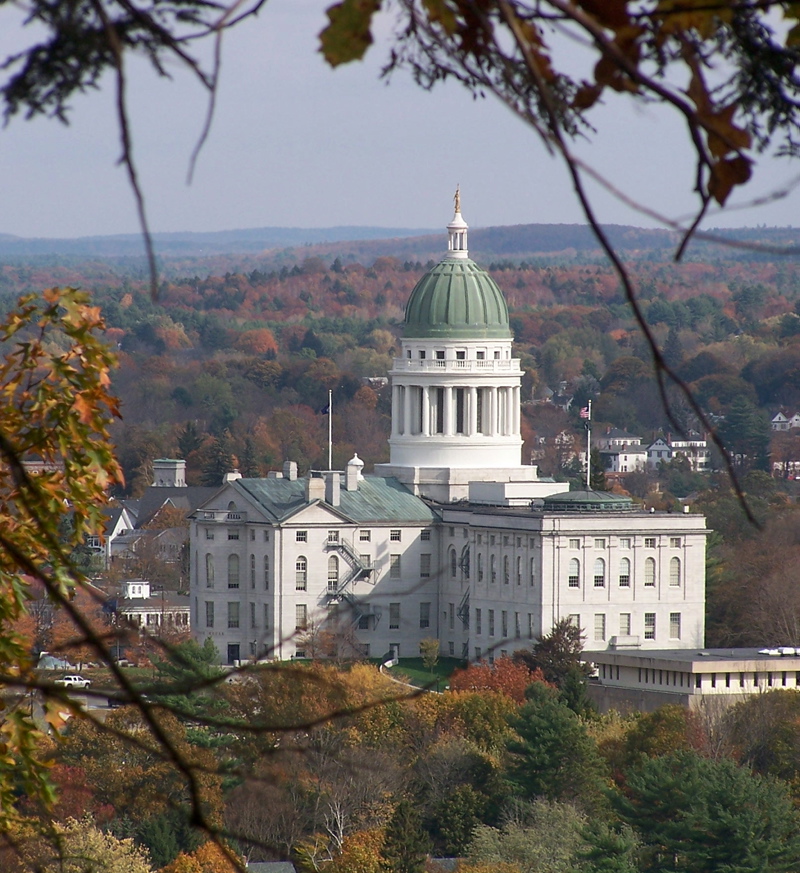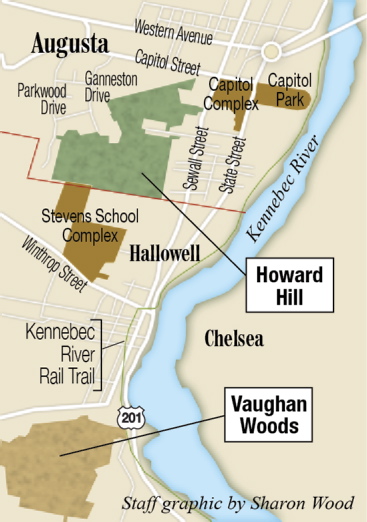AUGUSTA — If you think about what’s behind the Maine State House, you might miss the forest for the lobbying firms.
However, under a conservation group’s proposed agreement with the city of Augusta, that largely unspoiled piece of land above the residential neighborhoods off Sewall Street, Howard Hill, would be opened to more recreational uses.
The Kennebec Land Trust announced Monday that it has entered into an agreement to buy the 164-acre property, running from one point just south of Capitol Street to the Hallowell line at the Stevens School complex off Winthrop Street. After the purchase, likely to be final in two years, the trust is proposing to transfer the property to the city of Augusta with the condition that it be preserved perpetually.
Maine’s Capitol isn’t as well-known for its forested backdrop as, for example, Vermont’s Statehouse in Montpelier. That building is similarly situated against a forested hillside, but with no development directly behind it like what Maine has. But the forest’s low-key reputation is something the land trust wants to change.
“It’s something I think we’ve all taken for granted over the years, and that’s something we’re going to profile in this project,” said Theresa Kerchner, the land trust’s executive director. “This hill really defines the resources we all appreciate and that are important to our economy in Maine.”
Howard Hill was named for Capt. James Howard, known as Augusta’s first settler and the only commander of Fort Western. An account in a 1909 book on the area’s history said Howard came to the area with his family in 1754.
In the 1890s, Howard’s great-great-grandson, William Howard Gannett, bought the property on the hill and made Ganneston Park, complete with small ponds, carriage paths and trails, according to the land trust. His son started Guy Gannett Communications, which owned the Kennebec Journal, the Morning Sentinel, the Portland Press Herald and several television stations until its 1998 sale.
Today the carriage trails on Howard Hill form a loose system that some walk today, with informal access points open to the public in Augusta and Hallowell. On the hill, people can find unique views of the State House, the Kennebec River to the north and south, Augusta’s east side and the hills approaching Waldo and Knox counties.
Exact terms of the purchase agreement were not released, but the land trust said it will have an option to buy the property from its current owner, Augusta attorney Sumner Lipman, in 2015. Lipman didn’t return messages by deadline Monday, but he said in a news release that he was happy to help preserve the land, which he called a “pearl that all of the citizens of Maine can enjoy.”
The overall cost of the project, including property value and other costs, is about $1.5 million, said Howard Lake, a Winthrop attorney who worked on the deal. He didn’t give the exact sale price, but he said Lipman’s price was below market rate.
City assessment records show the land is made up of three parcels owned by Lipman and two corporations run by him, worth about $171,000 for tax purposes. At its current property tax rate, the city would lose about $3,100 annually in taxes by taking over the property.
The land trust would transfer the property along with a $100,000 endowment. It would go to the city to help manage Howard Hill. The trust will present the plan Thursday to the Augusta City Council, which has approval authority over it.
William Bridgeo, Augusta’s city manager, said it’s too early to tell what the city would do to help develop the property for recreational uses, and he expected the council to debate that over the coming weeks and months.
“As a native Mainer who loves his state, there’s an emotional pull to preserving that site,” Bridgeo said. âBut it doesn’t necessarily follow that the City Council and the city would proceed with developing recreational facilities there.”
The land trust wants to raise $1.25 million of the $1.5 million it needs to complete the project, Kerchner said, adding that she expects much of that money to come from foundations, private donors and the public Land for Maine’s Future program.
Brian Kent, of Litchfield, the trust’s president, said once the group gets some publicity for its effort, it shouldn’t have trouble reaching the fundraising goal.
“Who doesn’t want to preserve the backdrop to the State House?” he said.
Michael Shepherd — 370-7652 mshepherd@centralmaine.com Twitter: @mikeshepherdme
Send questions/comments to the editors.





Comments are no longer available on this story